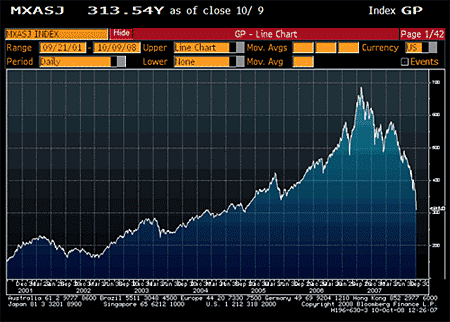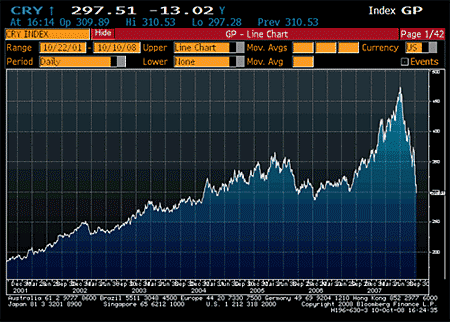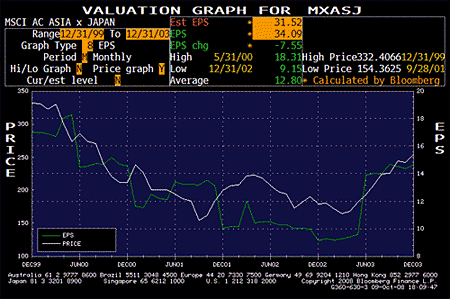Asia's looking very cheap - but the bear market isn't over yet
Terrified Asian investors are dumping stocks with no regard for fundamentals. Value has gone out the window. So it might sound bizarre to claim things are not all that bad, says Cris Sholto Heaton, but they're not.

Get the latest financial news, insights and expert analysis from our award-winning MoneyWeek team, to help you understand what really matters when it comes to your finances.
You are now subscribed
Your newsletter sign-up was successful
Want to add more newsletters?

Twice daily
MoneyWeek
Get the latest financial news, insights and expert analysis from our award-winning MoneyWeek team, to help you understand what really matters when it comes to your finances.

Four times a week
Look After My Bills
Sign up to our free money-saving newsletter, filled with the latest news and expert advice to help you find the best tips and deals for managing your bills. Start saving today!
This article is from MoneyWeek Asia, a FREE weekly email of investment ideas and news every Monday from MoneyWeek magazine, covering the world's fastest-developing and most exciting region. Sign up to MoneyWeek Asia here.
Brutal is the only world to describe last week's sell-off in Asia and around the world. Terrified investors are dumping stocks without regard for fundamentals. Value has gone out the window - all they care about is the safety of government bonds.
So it sounds bizarre to say that things are not all that bad. But they're not. Harrowing though these drops are, a plunge like this is better than the alternative. Since the US crisis is continuing to drag down otherwise healthy markets, a short, vicious sell-off is better than a multi-year bear market. The sooner we reach the point of maximum panic, the better.
MoneyWeek
Subscribe to MoneyWeek today and get your first six magazine issues absolutely FREE

Sign up to Money Morning
Don't miss the latest investment and personal finances news, market analysis, plus money-saving tips with our free twice-daily newsletter
Don't miss the latest investment and personal finances news, market analysis, plus money-saving tips with our free twice-daily newsletter
After all, one man's panic is another man's opportunity. While we certainly wouldn't recommend going all-in on the market while this chaos still rages, Asian stocks have been hammered down to an outstanding buying opportunity
Asia is now looking very cheap
Asian stocks have been hit harder than any region by this sell-off. The MSCI Asia ex Japan index fell as low as 308, erasing three years of gains.

That puts the index on a price/book ratio just above the 1.1-1.3 range, which has often been the bottom in previous bear markets. (Book value is a firm's assets minus its liabilities. Looking at price/book is generally a more useful way of assessing when a market might bottom than the price/earnings ratio, since earnings tend to fall sharply during a downturn, while book value should be little changed.)
To be fair, the AxJ has bottomed significantly lower twice between 0.8 and 0.9 during both the 1997-98 Asian financial crisis and the 1982 panic sparked by speculation over Hong Kong's future after the handover to China. But both of those were Asia-specific shocks, while today's problems come from elsewhere in the world. Since Asia is fundamentally healthy this time, it probably doesn't deserve to be valued at those rock-bottom levels.
None of this says the market can't plunge lower. In this highly-charged environment, what happens in the next couple of weeks is anyone's guess. But at these prices, Asia looks like outstanding value for investors who have a long-term focus and can cope with the volatility and risks of the next few months.
Three reasons to be bullish on Asia
That's because Asia is in the best shape of any region in the world once this panic is over. First, Asia doesn't have the huge debt burden that hangs over the rest of the world, meaning that Asian domestic demand can carry on growing over the next few years. On the other hand, the US, UK and large parts of Europe including formerly fast-growing Eastern Europe - are going to spend the next few years paying down huge amounts of debt, just like Japan did in the 90s.
Meanwhile, commodity prices are collapsing, as you can see from this chart of the CRB commodities index. That's good news for Asia, since most countries in the region import far more than they produce when it comes to natural resources.

Cheaper commodities mean there's now much less risk of inflation picking up even as central banks slash rates around the world to support growth. China, Hong Kong, India, South Korea and Taiwan all lowered rates this week and many more cuts will follow in the coming months.
Oil looks set to test $60-$70 a barrel, other fuels are coming off with it, copper is in freefall and most foodstuffs and base metals are down sharply from their highs. A broad-based retreat like this should both improve consumer confidence, since food is a much bigger part of living costs in developing Asia than in the West. It will also reduce construction costs crucial, since infrastructure investment is one way for governments to support growth and pump up the economy.
There is a downside to this Southeast Asia is an exporter of many commodities, so this means lower export earnings and smaller trade surpluses. But overall the result should be strongly positive. That leaves Asia in sharp contrast to South America, where many economies will be clobbered by falling commodity prices.
Finally, despite the US, UK and European recessions, Asia's exports shouldn't fall off a cliff. The region remains the lowest cost producer for many goods, and in tough times, people usually look for a cheaper solution, like Waitrose shoppers buying their baked beans in Lidl. So while Western consumers will cut back hard, Asia's price advantage could even see it gain market share.
Meanwhile, the oil cash that flowed into Russia and the Middle East should keep them buying Asia-made goods for quite a while. Yes, China's 30%-plus export growth is over for now - and hopefully for good, since the global economy needs to rebalance. But while Asia can't rely on exports for growth anymore, they won't disappear from the economy completely and leave a huge hole to be plugged.
Brace yourself for lower earnings
Despite this, we're going to have quite a bumpy ride over the next year or more, as the global economy adjusts. We're likely to see a big bounce in the markets in the next few weeks at least as long as the heavy artillery now being wheeled out by central banks has some effect. Given the extreme amount of fear in the markets at the moment, any signs that the crisis is abating should bring a big relief rally.
Such a rally would be global, not just in Asia. But we suspect that for Asia at least - a "double-dip" is quite likely, perhaps in the spring. The market might not go back to the lows that it touches this time round, but a big sell-off is definitely possible.
Why? Because earnings estimates remain much too high and when they come down it's likely to rattle the market again. Bloomberg consensus estimates for AxJ earnings over the next year are 31.52, down almost 8% on last year. That drop may look as if analysts are finally getting realistic, but history suggests not.
During 2000-03, earnings dropped around 50% peak to trough, as did the AxJ index itself. That probably won't happen this time: Asia is wealthier than it was back then, most countries are in better shape (that recession followed hot on the heels of the 1997-98 crisis) and domestic demand is a bigger part of their economies.
But they're certainly going to drop more than 8% - and we're likely to have another sell-off when the market realises it. That's exactly the pattern we saw in 2000-03 a sell-off after the dotcom bubble burst, a rally for several months, then another sell-off as earnings disappointed again. (The white line on the chart below is the AxJ, the green line is earnings per share.)

Once that's out of the way, Asia should be set. As we always warn at MoneyWeek, equities are volatile and investors should not be putting short-term cash in Asia or any stockmarket. But for longer-term investments five years or more Asia remains the most compelling story on the planet.
Turning to the markets

Almost every Asian market suffered a double-digit battering during the week-long storm, with Thailand worst hit after fresh clashes between police and anti-government protestors added to fears. The SET was shut for half an hour on Friday after dropping 10% during the day, while the Indonesian market was closed down both Thursday and Friday in an effort to stop the panic.
There were more signs that tight credit conditions are affecting companies, with steelmaker FerroChina suspended after the company said that it was unable to repay loans. FerroChina, which operates in China but is listed in Singapore, has stopped production at its mills while it negotiates with creditors and potential rescuers.
In Tokyo, New City Residence became the first Japanese real estate investment trust (Reit) to go bankrupt after being unable to refinance debt and raise loans for new purchases. The Japanese real estate sector is struggling with tight credit, higher construction costs and weaker demand, and New City's collapse comes after another 15 construction and property firms have already failed this year.
On the currency markets, the Japanese yen rose 5.5% against the dollar as worried speculators unwound carry trade positions (borrowing in low-interest rate yen to invest in higher-yielding assets elsewhere in the world). Most other Asian currencies slid as money fled emerging markets: the South Korean won slid to its lowest level since September 1998 on fears of liquidity problems in its banking system, before recovered slightly towards the end of the week as Korean authorities intervened to support the currency.
Get the latest financial news, insights and expert analysis from our award-winning MoneyWeek team, to help you understand what really matters when it comes to your finances.

Cris Sholt Heaton is the contributing editor for MoneyWeek.
He is an investment analyst and writer who has been contributing to MoneyWeek since 2006 and was managing editor of the magazine between 2016 and 2018. He is experienced in covering international investing, believing many investors still focus too much on their home markets and that it pays to take advantage of all the opportunities the world offers.
He often writes about Asian equities, international income and global asset allocation.
-
 New PM Sanae Takaichi has a mandate and a plan to boost Japan's economy
New PM Sanae Takaichi has a mandate and a plan to boost Japan's economyOpinion Markets applauded new prime minister Sanae Takaichi’s victory – and Japan's economy and stockmarket have further to climb, says Merryn Somerset Webb
-
 Plan 2 student loans: a tax on aspiration?
Plan 2 student loans: a tax on aspiration?The Plan 2 student loan system is not only unfair, but introduces perverse incentives that act as a brake on growth and productivity. Change is overdue, says Simon Wilson